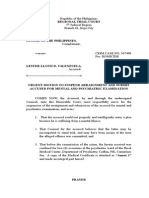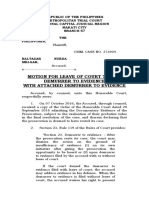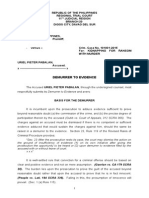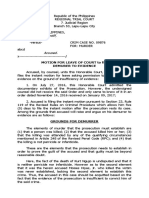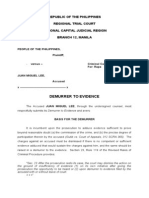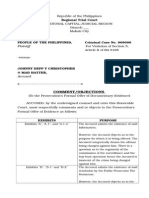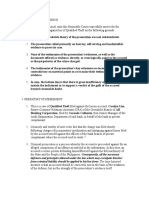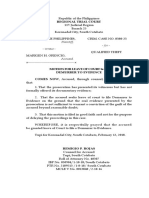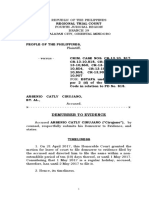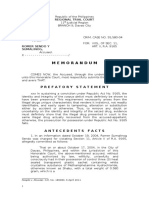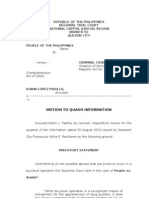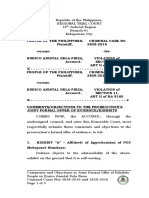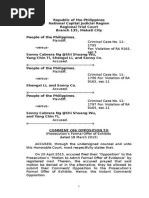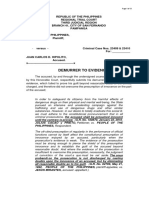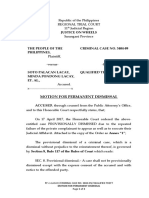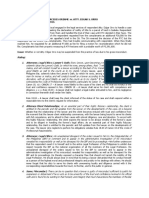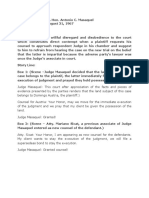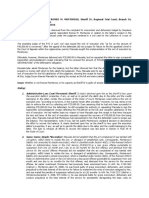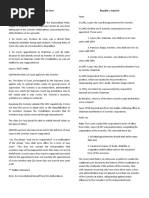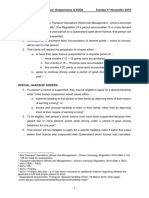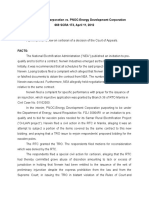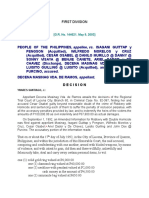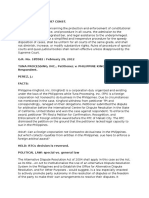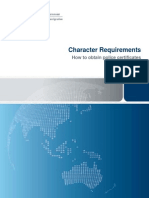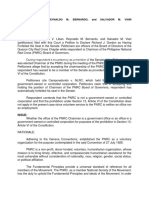Demurrer To Evidence
Demurrer To Evidence
Uploaded by
R.A. GregorioCopyright:
Available Formats
Demurrer To Evidence
Demurrer To Evidence
Uploaded by
R.A. GregorioOriginal Description:
Copyright
Available Formats
Share this document
Did you find this document useful?
Is this content inappropriate?
Copyright:
Available Formats
Demurrer To Evidence
Demurrer To Evidence
Uploaded by
R.A. GregorioCopyright:
Available Formats
Republic of the Philippines REGIONAL TRIAL COURT Third Judicial Region BRANCH 8 Malolos City, Bulacan
PEOPLE OF THE PHILIPPINES -versusCRIM. CASES No. For: Violation of Sections 5, Article II of Republic Act No. 9165
RAQUELO CARANGAN y ONARSI, Accused. x------------------------------------x
DEMURRER TO EVIDENCE
The Accused, assisted by the Public Attorneys Office and unto this Honorable Court, respectfully moves to dismiss the above-entitled actions for insufficiency of evidence. The two (2) sets of information were filed in this Honorable Court, and their respective accusatory portions read: Crim. Case No. 539-M-2007 (For: illegal sale of shabu) That on or about the 3rd day of February, 2007, in the municipality of Calumpit, province of Bulacan, Philippines, and within the jurisdiction of this Honorable Court, the above-named accused, without authority of law and legal justification, did then and there willfully, unlawfully and feloniously sell, trade, deliver, give away, dispatch in transit and transport dangerous drug consisting of one (1) heat-sealed transparent plastic sachet containing methylamphetamine hydrochloride (shabu) weighing 0.031 gram. Contrary to law. Crim. Case No. 540-M-2007 (For: illegal possession of shabu) That on or about the 3rd day of February, 2007, in the municipality of Calumpit, province of Bulacan, Philippines, and within the jurisdiction of this Honorable Court, the above-named accused, without authority of law and legal justification, did then and there willfully, unlawfully and feloniously have in his possession and control dangerous drug consisting of two (2) heat-sealed transparent plastic sachet containing methylamphetamine hydrochloride (shabu) weighing 0.041 and 0.038 gram.
Page 2 of 6
Contrary to law. The accused pleaded Not Guilty to the charges. The prosecution presented on trial the testimonies of PO1 Rufino Victoria and PO1 Danilo de Guzman. The testimony of forensic chemist Police Senior Inspector Maria Amelita A. Mendoza was dispensed with by stipulation. STATEMENT OF THE FACTS The facts as indicated in the affidavit of arrest of PO1 Rufino Victoria and PO1 Danilo de Guzman, upon which the prosecution based the indictment of the accused are as follows: On February 3, 2007 at about 2 oclock in the afternoon, a confidential informant reported to Police Superintendent Pedro Geronimo Ramos, Chief of the Provincial Drug Enforcement Group (PDEG), about the alleged illegal drug activities of a certain @Rocky, who was willing to sell illegal drugs to the confidential informant in the afternoon of the same date along Brgy. Longos, Calumpit, Bulacan. With the above information, a buy bust team was immediately organized and briefed wherein the confidential informant was designated as the poseur buyer to be accompanied by PO1 Rufino Victoria. A one (1) piece P500 bill was prepared with a dot marking on the forehead of the illustrious picture as the buy bust money. The pre-arranged signal was the removing of the baseball cap of PO1 Rufino Victoria once a drug deal was consummated. Upon arrival at the target area, the confidential informant together with PO1 Rufino Victoria approached the targets house while the rest of the team strategically followed at a viewing distance. When the confidential informant and PO1 Rufino Victoria reached the house of @Rocky, they called at the latter who later emerged from the door and joined the confidential informant and PO1 Rufino Victoria outside the house. The confidential informant informed @Rocky that they will buy shabu and introduced PO1 Rufino Victoria as a tropa. @Rocky demanded payment afterwhich he brought out from his pocket an embroidered coin purse and took therein a one (1) heat sealed transparent plastic sachet containing white granules believed to be shabu. At this juncture, the rest of the team closed in and the accused was freezed. PO1 Rufino Victoria frisked the accused and seized from him an embroidered coin purse which contained two (2) heat sealed transparent plastic sachets containing white granules suspected to be shabu as well as the P500.00 buy bust money. An inventory receipt of the three (3) heat sealed plastic sachets, small embroidered coin purse, and the one (1) piece P500.00 marked money was prepared. After admission of its offered exhibits, the prosecution rested its case. ISSUE Whether or not the evidence of the prosecution, standing on its own, is sufficient to overcome the presumption of innocence of the accused.
Page 3 of 6
ARGUMENTS Buy-bust operations have been proven to be an effective way to flush out illegal transactions that are otherwise conducted covertly and in secrecy. Nevertheless, while buy-bust operations have been recognized as such, it has a significant downside that has not escaped the attention of the framers of the law. It is susceptible to police abuse, the most notorious of which is its use as a tool for extortion. The nature of a buy-bust operation necessitates a stringent application of the procedural safeguards specifically crafted by Congress in R.A. 9165 to counter potential police abuses.1(italics added) Section 21 of Republic Act No. (R.A.) 9165 delineates the mandatory procedural safeguards that are applicable in cases of buy-bust operations, and one of which is enunciated as follows:
(1) The apprehending team having initial custody and control of the drugs shall, immediately after seizure and confiscation, physically inventory and photograph the same in the presence of the accused or the person/s from whom such items were confiscated and/or seized, or his/her representative or counsel, a representative from the media and the Department of Justice (DOJ), and any elected public official who shall be required to sign the copies of the inventory and be given a copy thereof; (emphasis added) xxx xxx xxx
The instant case stemmed from a buy-bust operation, which, under Section 21 of R.A. 9165 as provided above required the conduct of physical inventory and photograph immediately after seizure and confiscation, which must be done in the presence of the aforementioned third party representatives/witnesses. The prosecution has offered in evidence a Certification2 for the purpose of proving the inventory of the seized evidence conducted immediately after the buy-bust operation. Said Certificate indicates one Joseph Robielos, a representative from the media, as the witness to the confiscation and inventory. The defense notes that the inventory conducted by the apprehending team fell short of the required witnesses under Section 21 of R.A. 9165. On the face of said Certification, it is patent that the confiscation and inventory were not witnessed by a representative/counsel of the accused, a representative from the DOJ and any elected public official. Further, records show that the apprehending team did not also comply with the photograph requirement, as no photographs were ever offered and submitted by the prosecution as part of its evidence. While the prosecution may argue that the apprehending team is presumed to have performed their duties regularly especially that there was no indication that the arresting officers were impelled by improper motive when they testified against the accused, and that any failure to conform to
1
People v. Joel Ancheta et al., G.R. No. 197371, 13 June 2012, citing People v. Umipang, G.R. No.190321, 25 April 2012 2 Exhs. D to D-2
Page 4 of 6
the procedure laid down in Section 21 of R.A. 9165 would not cause the invalidity of the buy-bust operation and the inadmissibility of the confiscated items so long as the integrity and the evidentiary value of the items seized are preserved, the Supreme Court held in the case of People v. Sammy Umipang3 that courts must still thoroughly evaluate and differentiate those errors that constitute a simple procedural lapse from those that amount to a gross, systematic, or deliberate disregard of the safeguards drawn by the law. In the same case, Section 21(a) of the Implementing Rules and Regulations (IRR) of R.A. 9165 has been elucidated as consisting a saving clause in the procedures outlined under Section 21(1) of R.A. 9165 and under which the procedural aspects may be relaxed. Below is Section 21(a) of the IRR of R.A. 9165:
(a) The apprehending officer/team having initial custody and control of the drugs shall, immediately after seizure and confiscation, physically inventory and photograph the same in the presence of the accused or the person/s from whom such items were confiscated and/or seized, or his/her representative or counsel, a representative from the media and the Department of Justice (DOJ), and any elected public official who shall be required to sign the copies of the inventory and be given a copy thereof: Provided, that the physical inventory and photograph shall be conducted at the place where the search warrant is served; or at the nearest police station or at the nearest office of the apprehending officer/team, whichever is practicable, in case of warrantless seizures; Provided, further, that non-compliance with these requirements under justifiable grounds, as long as the integrity and the evidentiary value of the seized items are properly preserved by the apprehending officer/team, shall not render void and invalid such seizures of and custody over said items; (emphasis and underscoring added)
The above saving clause applies only where the prosecution recognized the procedural lapses, and thereafter explained the cited justifiable grounds after which the prosecution must show that the integrity and evidentiary value of the evidence seized have been preserved.4 To repeat, noncompliance with the required procedure will not necessarily result in the acquittal of the accused if: (1) the noncompliance is on justifiable grounds; and (2) the integrity and the evidentiary value of the seized items are properly preserved by the apprehending team.5 The records of the instant case are bereft of any indication that the prosecution has recognized the procedural lapses in the conduct of the buybust operation. In fact, it was only on the re-direct examination of prosecution witness PO1 Rufino Victoria that the prosecution attempted to justify the procedural lapses. A perusal of the records shows as follows:
3 4
G.R. No.190321, 25 April 2012 People v. Garcia, G.R. No. 173480, 25 February 2009 5 People v. De la Cruz, G.R. No. 177222, 29 October 2008
Page 5 of 6
Q: Mr. Witness, you admitted that your operation did not pass through barangay coordination? Can you tell us why? A: Because before we left the place of Rocky, we asked the neighbors where the barangay hall was and the neighbors told us that the barangay hall was far from the place where Rocky resided; they also said that very seldom that the barangay officials would go to the barangay hall, sir. Q: I also noticed that you failed to take photographs. Why is that, Mr. Witness? A: We had no camera at that time when we conducted the operation, but I remember there was a picture taking in the office, sir.6
Based on the above, the defense respectfully believes that the reasons of the apprehending team for not complying with the procedural safeguards under Section 21(1) of R.A. 9165 are flimsy excuses and are far from justifiable. A mere statement that pictures were taken, where said pictures were not even presented and submitted in evidence, is unmeritorious. Records also show that no attempt to contact a representative from the DOJ and an elected public official was made. There was thus no genuine and sufficient effort on the part of the apprehending team to comply with the procedures. Neither did the prosecution provide an account or explanation on how the apprehending team preserved the integrity of the items seized vis-a-vis the lapses in the conduct of the buy-bust operation. Moreover, the defense further respectfully stands that the aforesaid lapses were not simple procedural lapses. These are gross, systematic and deliberate disregard of the procedural safeguards prescribed by law. It is elucidated in the case of People v. Sammy Umipang that despite the presumption of regularity in the performance of the official duties of law enforcers, it bears stressing that the step-by-step procedure outlined under R.A. 9165 is a matter of substantive law, which cannot be simply brushed aside as a simple procedural technicality. The provisions were crafted by Congress as safety precautions to address potential police abuses, especially considering that the penalty imposed may be life imprisonment. When there is gross disregard of the procedural safeguards prescribed in the substantive law, serious uncertainty is generated about the identity of the seized items that the prosecution presented in evidence. This uncertainty cannot be remedied by simply invoking the presumption of regularity in the performance of official duties, for a gross, systematic, or deliberate disregard of the procedural safeguards effectively produces an irregularity in the performance of official duties. As a result, the prosecution is deemed to have failed to fully establish the elements of the crime charged, creating reasonable doubt on the criminal liability of the accused.7
6 7
TSN, November 7, 2008, pages 26-27 People v. Sammy Umipang, G.R. No.190321, 25 April 2012, citing People v. Garcia, G.R. No. 173480, 25 February 2009
Page 6 of 6
PRAYER
WHEREFORE, premises considered, it is respectfully prayed of the
Honorable Court to dismiss the above-entitled action for insufficiency of evidence against the accused. Respectfully submitted. Malolos City, Bulacan. August 6, 2012. PUBLIC ATTORNEYS OFFICE
2/F New Hall of Justice Provincial Capitol Compound Malolos City, Bulacan
Counsel for the Accused
Assisted by:
DYANN O. CASTILLO Public Attorney I Roll No. 57888 IBP No. 873508;12/29/2011 MCLE Exempt (Admitted 2010)
Noted by:
HENRY M. FRANCISCO Public Attorney IV/ OIC Roll No. 48655 IBP Lifetime Roll No. 09533 O.R. No. 847308 (January 07, 2011) MCLE Compliance No. IV-0006507 (June 26, 2012)
The Branch Clerk of Court RTC-Bulacan, Branch 8 Malolos City, Bulacan Greetings! Please submit this Demurrer to Evidence for the consideration of the Honorable Court promptly upon receipt hereof. Dyann O. Castillo
cc: FISCAL CATHERINE E. RUTOR-REYES Asst. Provincial Prosecutor OFFICE OF THE PROVINCIAL PROSECUTOR Provincial Capitol Compound Malolos City, Bulacan
You might also like
- Demurrer To Evidence - RA9165-SampleDocument4 pagesDemurrer To Evidence - RA9165-SampleTM Sanchez100% (10)
- Demurrer To EvidenceDocument16 pagesDemurrer To EvidenceGil Angelo De Leon86% (7)
- Ece Laws, Contract, Ethics, Standards & Safety: R.A. 9292 VS R.A. 5734Document27 pagesEce Laws, Contract, Ethics, Standards & Safety: R.A. 9292 VS R.A. 5734Iñaki Zuriel Constantino67% (3)
- Amicable Settlement SampleDocument2 pagesAmicable Settlement SampleRey Janolino Jr80% (20)
- Motion For Leave of Court To File Demurrer To The EvidenceDocument2 pagesMotion For Leave of Court To File Demurrer To The EvidenceAnna Raven100% (26)
- Demurrer To Evidence - SampleDocument4 pagesDemurrer To Evidence - SampleNJ Geerts89% (19)
- Urgent Motion To Suspend Arraignment and Confine Accused For Mental & Psychiatric ExaminationDocument4 pagesUrgent Motion To Suspend Arraignment and Confine Accused For Mental & Psychiatric ExaminationLiezl CatorceNo ratings yet
- Demurrer To Evidence Sample FormDocument4 pagesDemurrer To Evidence Sample Formmuton20No ratings yet
- Demurrer To Evidence - PaglicauanDocument17 pagesDemurrer To Evidence - PaglicauanNikki Mendoza75% (4)
- Motion For Leave Demurrer) MelgarDocument11 pagesMotion For Leave Demurrer) MelgarRichard Conrad Foronda Salango100% (2)
- Demurrer To EvidenceDocument7 pagesDemurrer To EvidenceR.A. Gregorio0% (1)
- Demurrer To Evidence BP 6 Bernardo BuenoDocument6 pagesDemurrer To Evidence BP 6 Bernardo BuenoRaffy Pangilinan50% (2)
- Motion For Leave of Court To File Demurrer To EvidenceDocument4 pagesMotion For Leave of Court To File Demurrer To EvidenceCyril Oropesa100% (6)
- Demurrer To Evidence Final by JayDocument3 pagesDemurrer To Evidence Final by Jayjade123_129100% (7)
- Demurrer To EvidenceDocument5 pagesDemurrer To EvidenceJANN100% (2)
- Demurrer To EvidenceDocument4 pagesDemurrer To EvidenceRoselette ColisNo ratings yet
- Demurrer To EvidenceDocument4 pagesDemurrer To Evidencehaberallan2114614100% (3)
- Demurrer To EvidenceDocument2 pagesDemurrer To EvidenceDiwa Rafael Bontuyan100% (3)
- Sample Motion For Leave of Court To File Demurrer To Evidence-LibelDocument3 pagesSample Motion For Leave of Court To File Demurrer To Evidence-LibelRose Ann Veloria100% (2)
- Comment OppositionDocument9 pagesComment OppositionJoanna Marin100% (2)
- Demurrer - Nabua Rev01Document8 pagesDemurrer - Nabua Rev01France Ramos100% (1)
- Objection To Formal Offer of EvidenceDocument2 pagesObjection To Formal Offer of Evidencemarilyn domalaon89% (9)
- MOTION To QuashDocument4 pagesMOTION To QuashGigiRuizTicar67% (3)
- Demurrer To EvidenceDocument14 pagesDemurrer To EvidenceThirdy Demonteverde100% (1)
- Comment On Formal Offer of EvidenceDocument2 pagesComment On Formal Offer of EvidenceHangul Si Kuya Ali100% (14)
- Application Form For ACR I-CARD NEWDocument2 pagesApplication Form For ACR I-CARD NEWchachi100% (2)
- Maquiling Vs ComelecDocument2 pagesMaquiling Vs Comelecmei_2208100% (9)
- Motion For Leave of Court To File Demurrer To EvidenceDocument2 pagesMotion For Leave of Court To File Demurrer To Evidencejcc100% (1)
- Demurrer To Evidence - Jimmy NebridaDocument17 pagesDemurrer To Evidence - Jimmy Nebridagilberthufana446877No ratings yet
- Sample Demurrer To EvidenceDocument9 pagesSample Demurrer To EvidenceJomyr BuenaobraNo ratings yet
- Republic of The Philippines Fourth Judicial Region Regional Trial Court Branch 8 - Batangas CityDocument4 pagesRepublic of The Philippines Fourth Judicial Region Regional Trial Court Branch 8 - Batangas CityNikki MendozaNo ratings yet
- Motion For Leave of Court Demurrer To EvidenceDocument2 pagesMotion For Leave of Court Demurrer To EvidenceRemigio RojasNo ratings yet
- Demurrer To Evidence - MaraneDocument10 pagesDemurrer To Evidence - MaraneOmnibus Musc100% (3)
- Demurrer To EvidenceDocument5 pagesDemurrer To EvidenceSolomon Chungalao100% (2)
- People of The Philippines, PlaintiffDocument3 pagesPeople of The Philippines, PlaintiffDiane JulianNo ratings yet
- Motion For Leave To File Demurrer - SampleDocument3 pagesMotion For Leave To File Demurrer - SampleEligene Patalinghug100% (2)
- Demurrer To Evidence With Leave of CourtDocument8 pagesDemurrer To Evidence With Leave of CourtVincentRaymondFuellas100% (3)
- Demurrer To Evidence Sample FormDocument3 pagesDemurrer To Evidence Sample Formsteller0827100% (4)
- Demurrer To Evidence FORMATTED CHANGE NAME NA LANG KULANGDocument18 pagesDemurrer To Evidence FORMATTED CHANGE NAME NA LANG KULANGEvelyn Tocgongna100% (7)
- Demurrer To EvidenceDocument27 pagesDemurrer To EvidenceShelamarie M. Beltran100% (2)
- Motion For Leave To File DemurrerDocument3 pagesMotion For Leave To File DemurrerRetsacelet Nam100% (3)
- Demurrer 2Document8 pagesDemurrer 2Janus Mari AbanNo ratings yet
- Demurrer To EvidenceDocument3 pagesDemurrer To EvidenceOyama Ona100% (1)
- Demurrer LoquillanoDocument8 pagesDemurrer LoquillanoFelice Juleanne Lador-Escalante100% (2)
- Demurrer To Evidence - Susan Domingo PDFDocument9 pagesDemurrer To Evidence - Susan Domingo PDFRosalinda MontenegroNo ratings yet
- Memorandum Ra 9165 2Document7 pagesMemorandum Ra 9165 2JFANo ratings yet
- Regional Trial Court: Motion To Quash Search Warrant And/Or To Suppress EvidenceDocument7 pagesRegional Trial Court: Motion To Quash Search Warrant And/Or To Suppress EvidenceChan Ders100% (1)
- Comments To Formal OfferDocument3 pagesComments To Formal OfferDaphne Jade Estandarte PanesNo ratings yet
- Comment and Opposition To Formal Offer of EvidenceDocument5 pagesComment and Opposition To Formal Offer of Evidencenenezz80% (10)
- Motion To QuashDocument7 pagesMotion To QuashIra Comia Soguilon100% (4)
- Comment To Formal Offer - CatubigDocument3 pagesComment To Formal Offer - CatubigHan NahNo ratings yet
- Comment and Objections-Dela PiezaDocument3 pagesComment and Objections-Dela PiezaHan Nah100% (2)
- Petition For BailDocument3 pagesPetition For BailRetsacelet Nam100% (1)
- Demurrer To EvidenceDocument7 pagesDemurrer To Evidencebingkydoodle1012No ratings yet
- Demurrer To EvidenceDocument12 pagesDemurrer To EvidenceRachelNo ratings yet
- Demurrer To EvidenceDocument6 pagesDemurrer To EvidenceJhanAlekzTaguiam100% (1)
- Motion To Quash InformationDocument7 pagesMotion To Quash InformationConcepcion CejanoNo ratings yet
- Comment and Opposition To The Formal OfferDocument7 pagesComment and Opposition To The Formal OfferMack Hale Bunagan100% (2)
- Comment - FOEDocument4 pagesComment - FOEjomalaw6714No ratings yet
- Demurrer To Evidence Juan Carlos HipolitoDocument13 pagesDemurrer To Evidence Juan Carlos HipolitoJoseph John Madrid AguasNo ratings yet
- Motion For Permanent Dismiisal - LACAYDocument3 pagesMotion For Permanent Dismiisal - LACAYHan NahNo ratings yet
- Demurrer To EvidenceDocument6 pagesDemurrer To EvidenceLee SomarNo ratings yet
- People vs. Lazaro, 886 SCRA, Nov. 21, 2018Document20 pagesPeople vs. Lazaro, 886 SCRA, Nov. 21, 2018Elaine GuayNo ratings yet
- PEOPLE OF THE PHILIPPINES, Plaintiff-Appellee, v. FREDDIE LADIP Y RUBIO, Accused - G.R. No. 196146, March 12, 2014 FactsDocument5 pagesPEOPLE OF THE PHILIPPINES, Plaintiff-Appellee, v. FREDDIE LADIP Y RUBIO, Accused - G.R. No. 196146, March 12, 2014 FactsTootsie GuzmaNo ratings yet
- A) Death B) Reclusion Perpetua: Indivisible PenaltiesDocument12 pagesA) Death B) Reclusion Perpetua: Indivisible PenaltiesR.A. GregorioNo ratings yet
- StellarDocument1 pageStellarR.A. GregorioNo ratings yet
- Assignment 2Document1 pageAssignment 2R.A. GregorioNo ratings yet
- Boat Jetty Cargo Ships Cruise Ships Ferries Yachts ElastomerDocument1 pageBoat Jetty Cargo Ships Cruise Ships Ferries Yachts ElastomerR.A. GregorioNo ratings yet
- Music Describes Three Interrelated Uses of The Term "Music Theory"Document1 pageMusic Describes Three Interrelated Uses of The Term "Music Theory"R.A. GregorioNo ratings yet
- Monochromatic Colors Are All The Colors (Tones,: Tints and Shades HueDocument1 pageMonochromatic Colors Are All The Colors (Tones,: Tints and Shades HueR.A. GregorioNo ratings yet
- PussyDocument4 pagesPussyR.A. GregorioNo ratings yet
- Hawking RadiationDocument2 pagesHawking RadiationR.A. GregorioNo ratings yet
- Asteroid BeltDocument2 pagesAsteroid BeltR.A. GregorioNo ratings yet
- History: Vaccinium Vitis-IdaeaDocument1 pageHistory: Vaccinium Vitis-IdaeaR.A. GregorioNo ratings yet
- Bobby Drake: Iceman (Robert Louis "Bobby" Drake) Is A FictionalDocument2 pagesBobby Drake: Iceman (Robert Louis "Bobby" Drake) Is A FictionalR.A. GregorioNo ratings yet
- Lingonberry JamDocument1 pageLingonberry JamR.A. GregorioNo ratings yet
- AnimesDocument1 pageAnimesR.A. GregorioNo ratings yet
- 2 Prohibited Motions and PleadingsDocument2 pages2 Prohibited Motions and PleadingsR.A. GregorioNo ratings yet
- DeferralsDocument1 pageDeferralsR.A. GregorioNo ratings yet
- Jurisdiction CasesDocument40 pagesJurisdiction CasesR.A. GregorioNo ratings yet
- Kaiser Permanente (Document1 pageKaiser Permanente (R.A. GregorioNo ratings yet
- Ramiscal vs. OrroDocument2 pagesRamiscal vs. OrroR.A. GregorioNo ratings yet
- LokiDocument1 pageLokiR.A. GregorioNo ratings yet
- LZK Holdings Development Corp. vs. Planter Development Bank FULL TEXTDocument5 pagesLZK Holdings Development Corp. vs. Planter Development Bank FULL TEXTR.A. Gregorio0% (1)
- Austria vs. Hon. Masaquel Doctrinal DigestDocument3 pagesAustria vs. Hon. Masaquel Doctrinal DigestR.A. GregorioNo ratings yet
- Marsada vs. MonterosoDocument2 pagesMarsada vs. MonterosoR.A. GregorioNo ratings yet
- b.07 - Villongco Vs Moreno, GR L-17240Document4 pagesb.07 - Villongco Vs Moreno, GR L-17240R.A. GregorioNo ratings yet
- Mcdonalds Vs LC Big MakDocument20 pagesMcdonalds Vs LC Big MakR.A. GregorioNo ratings yet
- 2011 Bar Exam RemDocument15 pages2011 Bar Exam RemR.A. GregorioNo ratings yet
- Application For Scholarship Scheme Form No-34Document4 pagesApplication For Scholarship Scheme Form No-34Shubjot Singh100% (1)
- Law On Travel Documents: Republic of Serbia Ministry of InteriorDocument15 pagesLaw On Travel Documents: Republic of Serbia Ministry of InteriorKumar SunilNo ratings yet
- Nacionalista Party V de Vera Republic V ImperialDocument2 pagesNacionalista Party V de Vera Republic V ImperialRed ConvocarNo ratings yet
- Certificate of OriginalityDocument1 pageCertificate of Originalitychrystalstar2000No ratings yet
- Daryl Shane Pate Bond ReductionDocument2 pagesDaryl Shane Pate Bond Reductionjafranklin-1No ratings yet
- QLD Driving SuspensionsDocument2 pagesQLD Driving SuspensionsTed SheppardNo ratings yet
- Nerwin Industries Corporation VsDocument3 pagesNerwin Industries Corporation VsSong Ong100% (1)
- People of The Philippines vs. Guadalupe Zapata, Et Al.: Supreme CourtDocument2 pagesPeople of The Philippines vs. Guadalupe Zapata, Et Al.: Supreme CourtNyl AnerNo ratings yet
- Exemplar For Assignment Answer - 1 - 2011Document4 pagesExemplar For Assignment Answer - 1 - 2011Hamish BowmakerNo ratings yet
- Sweetheart Part One - Marie MackayDocument418 pagesSweetheart Part One - Marie Mackayvivi2003souzaNo ratings yet
- PR21CC - Liga NG Barangay Kagawad PDFDocument1 pagePR21CC - Liga NG Barangay Kagawad PDFBryan Cesar V. AsiaticoNo ratings yet
- Cases 2Document55 pagesCases 2Vianne Marie O. GarciaNo ratings yet
- Art Viii Sec 5Document3 pagesArt Viii Sec 5losarimNo ratings yet
- Family Law-I Project TopicsDocument20 pagesFamily Law-I Project TopicsSrishttiNo ratings yet
- POL611: Administrative Law SyllabusDocument4 pagesPOL611: Administrative Law SyllabusChad J. McGuire100% (1)
- Facts:: Benedicto Hornilla and Atty. Federico D. Ricafort, vs. Atty. Ernesto S. SalunatDocument6 pagesFacts:: Benedicto Hornilla and Atty. Federico D. Ricafort, vs. Atty. Ernesto S. SalunatFrancis DiazNo ratings yet
- Weekly Schedule Law510 March 2015Document14 pagesWeekly Schedule Law510 March 2015Mush EsaNo ratings yet
- 2015-00006319 Leiva Carlos 12271995 AformDocument2 pages2015-00006319 Leiva Carlos 12271995 AformRandom Pixels blogNo ratings yet
- 8 - Sto. Tomas v. Salac, G.R. No. 152642, November 13, 2012 (En Banc)Document3 pages8 - Sto. Tomas v. Salac, G.R. No. 152642, November 13, 2012 (En Banc)rommel alimagnoNo ratings yet
- Land Titles and Deeds Survey List of Cases (AY2018-2019)Document10 pagesLand Titles and Deeds Survey List of Cases (AY2018-2019)lalynNo ratings yet
- Character PenalDocument88 pagesCharacter PenalDastan KhanNo ratings yet
- The Newspapers LTD Vs The State Industrial Tribunal, ... On 20 March, 1957Document10 pagesThe Newspapers LTD Vs The State Industrial Tribunal, ... On 20 March, 1957Raghav GargNo ratings yet
- G.R. No. L-29300 Gallanosa V ArcangelDocument7 pagesG.R. No. L-29300 Gallanosa V ArcangelRogie ToriagaNo ratings yet
- Antamok Goldfields Mining Comp Vs CirDocument11 pagesAntamok Goldfields Mining Comp Vs Cireunice100% (1)
- Liban Vs GordonDocument2 pagesLiban Vs GordonJanskie Mejes Bendero LeabrisNo ratings yet
- 6 Tiu Siuco V CaDocument2 pages6 Tiu Siuco V CaJulius Manalo100% (1)






